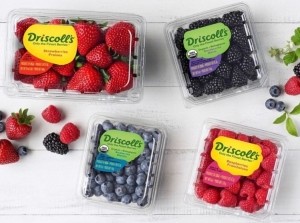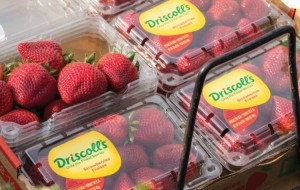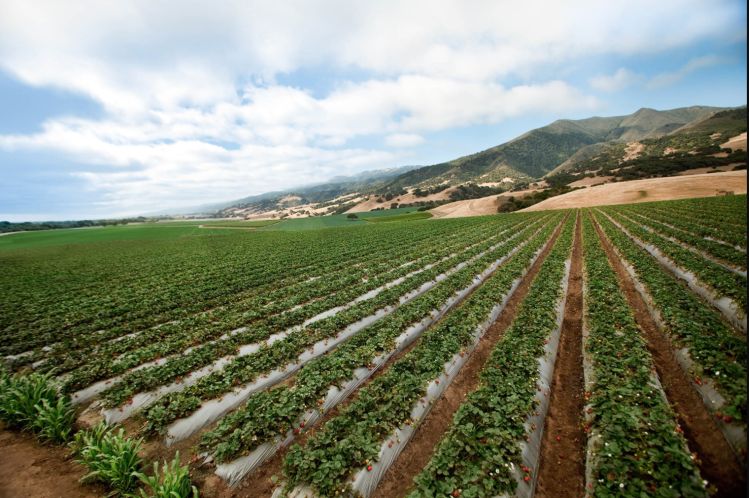Driscoll’s president: 'We don't want to throw fruit away'

While no one was panic-buying fresh berries in mid-March, retail demand has increased as consumption has shifted to the home, but retail supply chains have not caught up, leaving “berry displays one third the normal size, even though supplies are available, which means that that fruit is somewhere else back in the chain,” said Soren Bjorn.
“Items such as fresh berries were deprioritized as retailers focused on those items [shelf-stable and frozen essentials suddenly in high demand] and something else had to give.”
‘Items such as fresh berries were deprioritized’
In some cases, retailer distribution centers were simply overwhelmed and turned some fresh produce deliveries away, albeit temporarily, he told FoodNavigator-USA.
“We literally had full trucks of raspberries that arrived at the customer distribution center on time, and they said, ‘We can’t get you in the door, come back in three days,’ and we’re talking about a product with a 10 day shelf-life. If you lose three days, you can lose the whole product.”
In other cases, unique perishable items just fell off some retailers’ radars, he said: “We had some organic blackberries where some of our customers said we’re not going to worry about them right now, and they just stopped ordering them, but it wasn’t because there wasn’t any demand.”

To compound the woe, he said: “A lot of retailer distribution centers have been operating at less than full capacity at a time when there is all this added pressure on the grocery supply chain, so it’s caused this ripple effect, and perishable items such as fresh berries have been a bit of a victim of this.”
‘We don’t want to throw fruit away’
He added: “We can navigate this environment if we can get through the next two months, I’m very confident about that. But we don’t want to throw fruit away.
“We really think there’s a tremendous opportunity for the USDA to come up with a program to buy fruit, even if it is just at cost, and give it to the food banks to people really in need.
“We’ve been on several calls with the USDA and they are definitely listening to us, but time is ticking, so hopefully they can get themselves organized in time.”
Unlike many fresh produce suppliers that have a heavy emphasis on foodservice customers, and have been struggling to redirect supplies towards retail or other channels before they rot, more than 85% of business at Driscoll’s (which Bjorn says accounts for “about a third of the North American berry business”) is directed towards grocery retail.
Going forward, he said, retail demand will remain higher [as consumption has shifted towards the home], albeit not at surge levels.

“The question is, will it be high enough to offset the business lost through foodservice? We will have a lot more berries in four weeks. It’s going to be May, the sun is out, the quality is good and the price is right and people usually buy a lot of berries, but in this environment, can we get consumers excited?”
‘One of the obvious things we did early on was to increase our promotional presence online’
Like many firms, Driscoll’s has had to rethink marketing and promotional strategies amidst the pandemic, redirecting some spend towards digital marketing to support retail customers with online shopping platforms, for example.
“One of the obvious things we did early on was to increase our promotional presence online, supporting some of our retail customers that have an online presence and on Instacart and Shipt and so on, and we’ve moved some marketing dollars to support that," said Bjorn.
“But there’s nothing that can compare with those huge beautiful retail displays with heaps of berries, and if consumers are buying online and not shopping so much in the stores, or they are being guided by one way traffic [some retailers have introduced ‘one-way’ systems in stores] are you going to get those impulse purchases?”
Labor issues: ‘The reality is we are one of the few industries that is hiring people’
Thus far, Driscoll’s has not had any issues with labor shortages to pick fruit, and says that should the farmers it contracts with encounter problems, there is a ready supply of labor given that so many people in other industries are now looking for work, while guest workers recently hired to meet demand have all arrived.
“The reality is we are one of the few industries that is hiring people, and this is the time of year when farm workers make the most money,” said Bjorn.
“What we’ve been focusing on is ensuring that the people picking the fruit are safe, so we’ve been looking for the weaknesses in the system when it comes to social distancing. For example, we know that people congregate around the wash stations in the morning, so we immediately rented 350 wash stations just for production in southern California.
“There’s a lot of room in a field, it’s not like an office, but you still need to ensure people stay apart, and that’s counter cultural, as people that pick the fruit are part of a tightly knit community; they work together and eat together.”
Asked about shipping issues with fruit coming in from Mexico and Chile, Bjorn said: “South American blueberries and Mexican supply is primarily in the winter time when there’s no domestic production, and we’ve just got a couple more weeks on a couple of the berries and we won’t be back until October, so in those geographies we’re now focused on what might happen in the fall. Right now about 90% of production is domestic.”
Exports: ‘We typically fly our berries in the bellies of passenger planes, and they’re not running’
Asked about the firm’s export business, which supplies berries to markets including Dubai, Hong Kong, and Saudi Arabia, “That’s more of a challenge,” he conceded.
“Typically we fly our berries in the bellies of passenger planes, and those flights are not running, so we’ve had to move to cargo planes, where the air freight is two, three, four times more expensive, which can make the product unaffordable.”
Current woes notwithstanding, however, the future looks bright, he said: “The fresh berry category is healthy, tasty, convenient, and right where consumers want to be.
“Coming out of this, even in a recession, consumers will still want their berries. We have a lot of new things coming and we’ve also made some really exciting improvements in the flavor of some of our varieties, so this is a great business to be in.”
- Click HERE for information and resources collated by produce association United Fresh to help the fresh produce industry and supply chain partners address commonly asked questions around COVID-19.
Driscoll’s is deploying $4m+ in global charitable funds to help communities suffering due to the COVID-19 pandemic, with $2.5m destined for North America, $1m for Central Mexico and Baja [where it sources some fruits] and $500,000 for Europe and Morocco. An additional $500,000 in fresh berry donations will be delivered to first responders and hospitals in New York City.




















